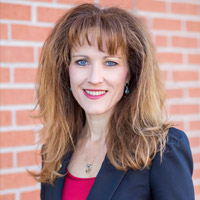Imagine a place where nurses can ask questions, gather information, and spur change in their profession. It’s not only a physical space, but also a nucleus for a large network of nurses, interdisciplinary colleagues, and nursing students.
The Center for Nursing Inquiry, located within the Office of Research and Scholarship at the University of Colorado College of Nursing at Anschutz Medical Campus, is precisely that: a hub supporting nurses in transforming what they know into knowledge, creating innovative solutions to elevate and enhance the nursing profession, and to translate evidence into world-class nursing care.
The Center fosters collaboration and offers resources so nurses can answer the most relevant health-related questions they see in their daily practice. Answering those questions can improve patients’ health and well-being across health systems.
“We want to support not only research inquiry, but all inquiry and developing scholarship,” CU Nursing Associate Dean of Research and Scholarship Teri L. Hernandez, PhD, RN, FAAN, says. “We want to foster the development of questions and how nurses can take those questions into research and real-life solutions.”
Starting Small with Goals to Expand
The beginnings of the CU Center for Nursing Inquiry began when the College had a Center for Nursing Research, or CNR. Hernandez says the CNR focused too much on research and supporting only a small portion of the College’s community. The Center for Nursing Inquiry aims to be more overarching and expansive.
“I recognize that research is one kind of question nurses ask – so this idea is to foster collaborations between research faculty, teaching faculty, and clinical faculty while bringing in students,” she says. “Every nurse should feel like they could come to us for help in developing their question to bring it to life.”

The Center for Nursing Inquiry is a space for collaboration. |
The Center also had strong support from CU Nursing Dean Elias Provencio-Vasquez, PhD, RN, FAAN, FAANP.
“In creating the Center for Nursing Inquiry, CU Nursing plays a pivotal role in developing nursing leaders and researchers,” he says. “Nursing is a close-knit community. We know nurses have thoughtful and insightful ideas, but they might need help figuring out how to get started in making their ideas a reality. Nurses are consistently asking questions about ways to change our healthcare system, and we want to support them in strengthening the profession and improving patient outcomes.”
The University of Iowa, Ohio State University, and Johns Hopkins University have similar centers, but CU Nursing’s is the only one in the western US. The Center for Nursing Inquiry aims to be a leader in the Mountain West region in supporting evidence-based practice and competency-based education.
“I dream that any nurse – whether it’s at CU Nursing, the Anschutz Medical Campus, or in our region can come to us for help in developing their question and bringing it into reality,” Hernandez says. “The idea behind the Center for Nursing Inquiry is, ‘How can nursing help serve the larger regional community?’”
Right now, the Center for Nursing Inquiry is open to CU Nursing faculty and students, and close partners at Children’s Hospital Colorado, UC Health, and Denver Health and Hospital. Eventually, Hernandez wants the Center to be open to researchers and students more broadly across the Anschutz Medical Campus, in the local nursing community, or the region, and offer consulting services. Hernandez also envisions supporting nurses working in hospitals and clinics across the state and region.
“I dream that any nurse – whether it’s at CU Nursing, the Anschutz Medical Campus, or in our region can come to us for help in developing their question and bringing it into reality,” Hernandez says. “The idea behind the Center for Inquiry is, ‘How can nursing help serve the larger regional community?’”
“We’re spoiled on the Anschutz Medical campus because we have many resources built in. But what if you’re a nurse scientist in the mountains, or at a small community hospital, and there are no research resources? Or, say you’re a faculty member or student at Fort Lewis College, where we have a close collaborative partnership. That’s the outreach we want to work with—we can help them,” she says.
Nursing research focuses on nursing practice, which includes research areas like advancing the nursing profession, improving patient outcomes and care, and making positive changes within the healthcare system. Graduate, Doctor of Nursing Practice (DNP), and Doctor of Philosophy (PhD) students work on research projects or a thesis with these goals in mind. The Center is equipped to guide nurses and students with the tools to make their ideas a reality.
Nurses can email questions about budgeting, grants, contacts, or methodological support for evidence-based practice, quality improvement (QI), program evaluation, or research.
“For example, if a nurse scientist at Children’s Hospital has a study they’re working on and need analytics to support data analysis, they can send us an email, describe what they need, and we can connect them with a biostatistician," Hernandez says.
How the Center Works
There are two ways to access the Center for Nursing Inquiry: one is to email the Office of Research and Scholarship or use a room on Anschutz Medical Campus in CU Nursing’s building, Education 2 North.
The Center’s physical space is a room filled with chairs, tables, and technology like a smart board so researchers can gather, network, and hold meetings.
“The idea is to create a welcoming space where people can come together and have organic discussions that turn into questions that then turn into research or inquiry. While we offer resources, it’s also important to have a physical space for intellectual curiosity,” Hernandez says.
Strengthening the Nursing Discipline
The Center is also focused on sparking creativity and passion among nurses who may be feeling burnt out or stagnant in their careers. Hernandez says nurse retention is still a major challenge in the profession, something that was exacerbated during the COVID-19 pandemic and continues five years later.
She says some nurses are leaving their jobs because they can’t work on quality improvement or scholarly projects.
“These nurses should be able to come to us for help so we can keep those questions going and keep those projects going,” she says. “We can have a reach beyond campus and elevate nursing. We can become a beacon for nursing research and inquiry.”


